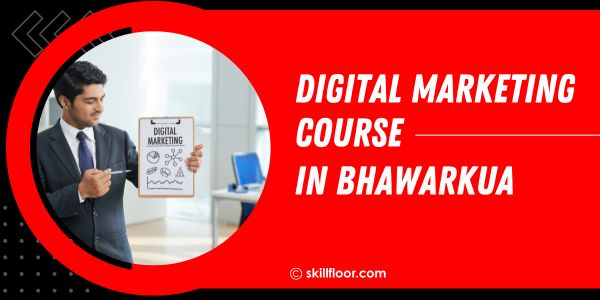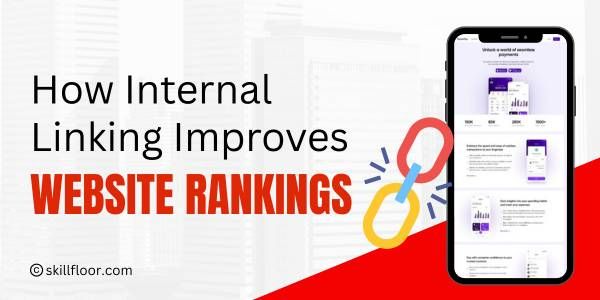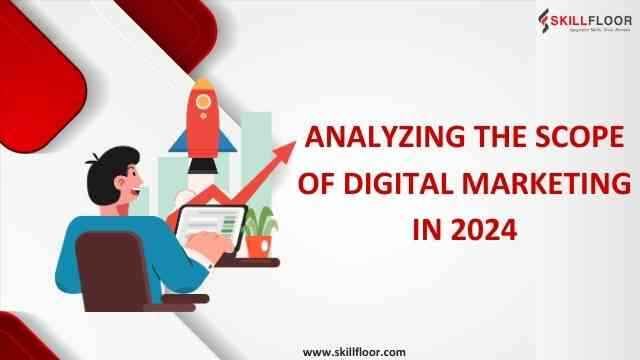What is PPC? Essential Tips for Online Marketing
Discover essential tips for online marketing with PPC. Learn how Pay-Per-Click advertising can boost your digital strategy effectively.
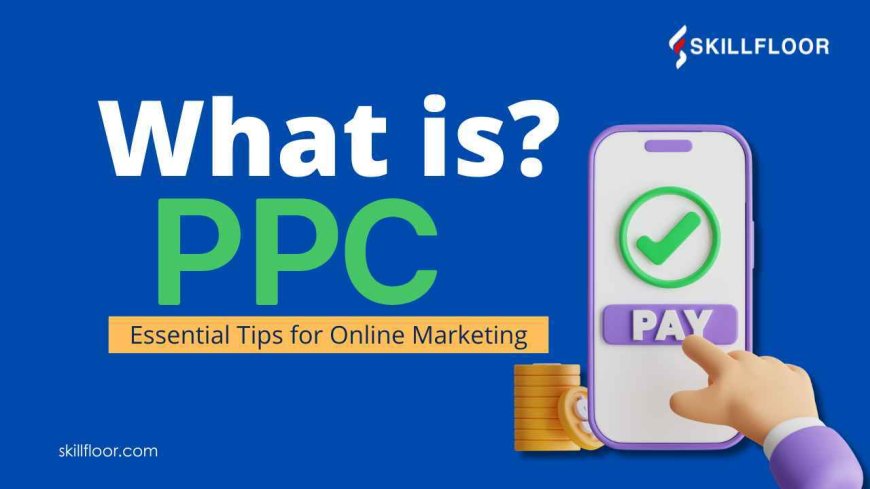
Hi there! Have you ever questioned what PPC is? It stands for Pay-Per-Click, which is a very helpful method of attracting online traffic to your website. Examining What is PPC? will reveal that it's a simple form of advertising in which you only have to pay when a user clicks on your link. Nice, huh? This implies that instead of waiting for visitors to arrive naturally, you are effectively purchasing visits to your website. What makes understanding PPC important now? For companies looking for focused traffic and immediate visibility, it's revolutionary. Imagine putting your advertisements on search engines or other websites, precisely where people who might become your clients are already browsing. PPC marketing gives you complete control over your advertising spend, audience targeting, and performance monitoring. Whether you're in charge of a large corporation or a small business, knowing What is PPC? can help you maximize your online potential and boost sales.
What is PPC?
Pay-per-click, or PPC, is an online advertising technique in which advertisers are charged a fee each time their ad is clicked. It's similar to buying website visits as opposed to obtaining them naturally. PPC is a method used by search engines like Google and Bing to provide advertising services. These advertisements, which have a little "Ad" label at the top of search results, are probably familiar to you. PPC advertising involves companies bidding for their business-related keywords to appear as sponsored links on search engine results pages. For instance, if you place a bid on the keyword "PPC marketing tips," when someone searches for that phrase, your advertisement may appear right at the top of the Google results page. In basic terms, PPC enables you to increase your website's visibility right away and attract relevant traffic.
Benefits of PPC in Online Marketing
Pay-per-click (PPC) advertising improves return on investment by rapidly directing targeted visitors to websites and producing quantifiable outcomes. It is a flexible strategy for increasing online awareness because it provides exact control over money and audience targeting.
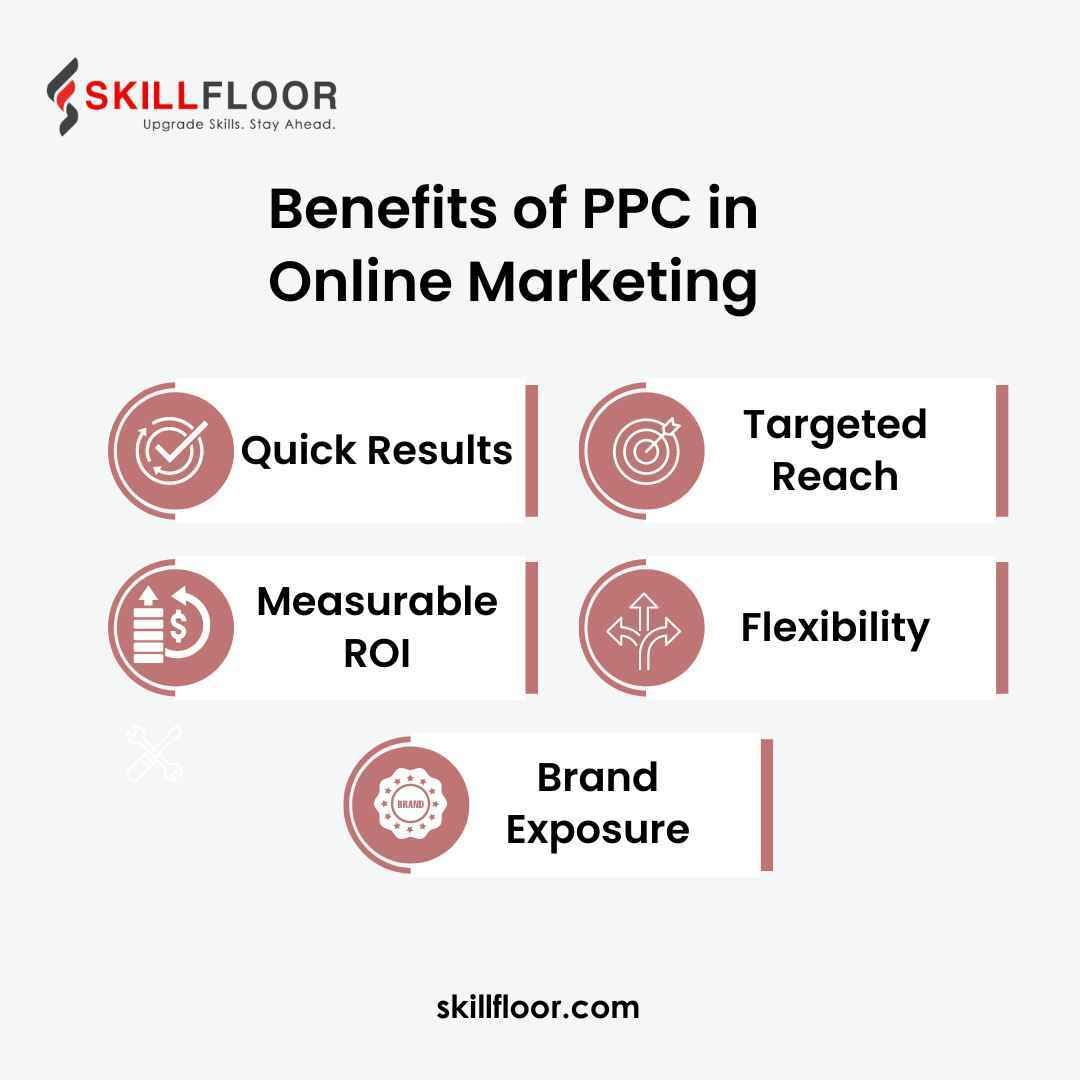
Quick Results: One of PPC's biggest benefits is its capacity to produce results quickly. PPC advertisements can generate traffic almost instantly once they go up, in contrast to SEO, which sometimes takes months to show results.
Targeted Reach: PPC makes exact targeting possible. Your audience can be selected according to their device, location, language, device kind, and even the time of day. Thus, the right people see your advertisements at the right moment.
Measurable ROI: PPC has a very measurable ROI. You can monitor impressions, clicks, and conversions, as well as the precise cost of each click and the return on investment.
Flexibility: You have total control over your budget with PPC and can make any necessary adjustments. As you gain familiarity and confidence, you can build up from a tiny initial investment to evaluate how well your advertising performs.
Brand Exposure: Seeing your ads appear regularly in search results helps build credibility and brand awareness even if visitors don't click on them.
Essential Tips for Successful PPC Campaigns
-
Keyword Research: Conducting comprehensive keyword research is the first step in determining the terms that prospective buyers are likely to search for. Using tools such as Google Keyword Planner, you can locate low-competition, relevant keywords with a high search volume.
-
Compelling Ad Copy: Your advertisement should have a clear, powerful call to action and compelling copy. To get clicks, emphasize the special features of your product or service.
-
Landing Page Optimization: Make sure the page to which you are sending traffic is optimized for conversions and pertinent to the advertisement. A strong landing page should feature an obvious call to action, interesting content, and a clear headline.
-
A/B testing: Test several iterations of your landing pages and advertisements frequently to determine which works best. Over time, this technique—known as A/B testing—helps you optimize your efforts.
-
Negative Keywords: Employ negative keywords to stop unrelated searches from displaying your ads. This guarantees that your advertising is seen by the most relevant audience while saving you money.
-
Monitor Performance: Pay special attention to your campaign's KPIs, including conversion rate, cost per click (CPC), and click-through rate (CTR). Make educated judgments and modifications by using this data.
-
Budget Management: Establish and adhere to a reasonable spending limit for your PPC advertising. To increase your return on investment, give your top-performing ads and keywords a larger budget.
Common PPC Mistakes to Avoid
-
Ignoring Mobile Users: A lot of people browse on their phones. Should your landing pages and advertisements not be optimized for mobile devices, you may miss out on prospective clients. Make sure your ads always display well on mobile devices.
-
Skipping Ad Extensions: Ad extensions supplement your ads with more information, such as URLs or phone numbers. They can increase the attractiveness and click-through rate of your ads. Make use of them to entice viewers to click on your advertisement.
-
Forgetting Your Campaigns: Pay-per-click advertising isn't something you set and forget. To maintain your advertising' effectiveness, you must frequently review and alter it. Keep your advertisements up to date and aware of changes.
-
Using Broad Keywords: When using broad keywords, many individuals see your advertisements, but not always the proper ones. To reach the proper audience and save money on pointless clicks, use targeted keywords.
-
Not Tracking Results: You can't determine whether your advertisements are effective if you don't monitor what users do after clicking on them. Establish tracking to find out how many of your advertisements result in sales, sign-ups, or contact requests.
Advanced PPC Strategies
Remarketing: This strategy lets you reach out to people who have come to your website before but left without making a purchase. This tactic helps you regain lost conversions and maintains your brand at the forefront of consumers' minds.
Dynamic Search Ads (DSAs): DSAs use the content of your website to automatically match your ads to relevant queries. You can fill in any holes in your keyword list and discover new chances by doing this.
Audience Segmentation: Make highly focused campaigns by utilizing audience data. More individualized and successful advertisements might result from audience segmentation based on behavior, interests, or previous encounters.
Ad Scheduling: Determine the peak times of your audience's activity and plan your ads to run during those periods. By doing this, you can be sure that your money is being spent when it will have the biggest impact.
Analyze your competitors: Pay attention to their PPC tactics. You can improve your strategy by using tools like SEMrush and SpyFu, which may provide you with insights into their budget, ad wording, and keywords.
you may greatly improve your digital strategy by learning what is PPC? and implementing the important ideas for online marketing into practice. PPC advertising is a priceless resource for companies of all kinds since it provides instant visibility, accurate targeting, and quantifiable outcomes. In the competitive online economy, you may successfully drive targeted visitors, increase brand awareness, and maximize your return on investment by avoiding typical errors and utilizing innovative strategies.

















































